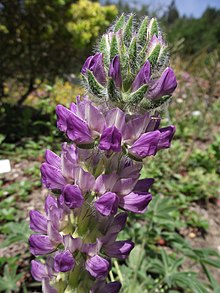Lupinus microcarpus, the wide-bannered lupine or chick lupine, is a species of lupine native to western North America from southwestern British Columbia south through Oregon and California, including the Mojave Desert, and into Baja California. There is also a disjunct population in South America, with locations in central Chile and western Argentina.
| Lupinus microcarpus | |
|---|---|

| |
| Lupinus microcarpus var. microcarpus | |
| Scientific classification | |
| Kingdom: | Plantae |
| Clade: | Tracheophytes |
| Clade: | Angiosperms |
| Clade: | Eudicots |
| Clade: | Rosids |
| Order: | Fabales |
| Family: | Fabaceae |
| Subfamily: | Faboideae |
| Genus: | Lupinus |
| Species: | L. microcarpus
|
| Binomial name | |
| Lupinus microcarpus | |
Description
editLupinus microcarpus is an annual plant growing to 80-centimetre (31 in) tall. The leaves are palmately compound with 5-11 leaflets 1-centimetre (0.39 in)–5-centimetre (2.0 in) long and up to 1-centimetre (0.39 in) broad.
The flowers are generally pink to purple in color, but can also be between white and yellow; they are produced in open whorls on an erect spike.
Lupinus microcarpus grows from sea level in the north of its range, up to 1,600-metre (5,200 ft) high in Southern California.
Varieties
editThere are three named botanical varieties:
- Lupinus microcarpus var. densiflorus - whitewhorl lupine[1] or dense-flowered lupine. Endemic and restricted to western California (formerly Lupinus densiflorus).[2]
- Lupinus microcarpus var. horizontalis. Endemic and restricted to southeastern California deserts.[3]
- Lupinus microcarpus var. microcarpus. Widespread, British Columbia to Chile.[4]
Phytoremediation waste management
editChilean scientists (Universidad de Santiago de Chile) studying phytoremediation waste management in the city of Antofagasta, discovered that plants are capable of absorbing arsenic from the soil.[citation needed]
References
edit- ^ USDA, NRCS (n.d.). "Lupinus densiflorus". The PLANTS Database (plants.usda.gov). Greensboro, North Carolina: National Plant Data Team. Retrieved 24 June 2015.
- ^ Jepson Manual treatment for LUPINUS microcarpus var. densiflorus . accessed 10.21.2011
- ^ Jepson Manual treatment for LUPINUS microcarpus var. horizontalis . accessed 10.21.2011
- ^ Jepson Manual treatment for LUPINUS microcarpus var. microcarpus . accessed 10.21.2011
- Mojave Desert Wildflowers, Jon Mark Stewart, 1998, pg. 137
- Chilean Scientists use the plant for wastes' Phytoremediation clean-up management of soils.